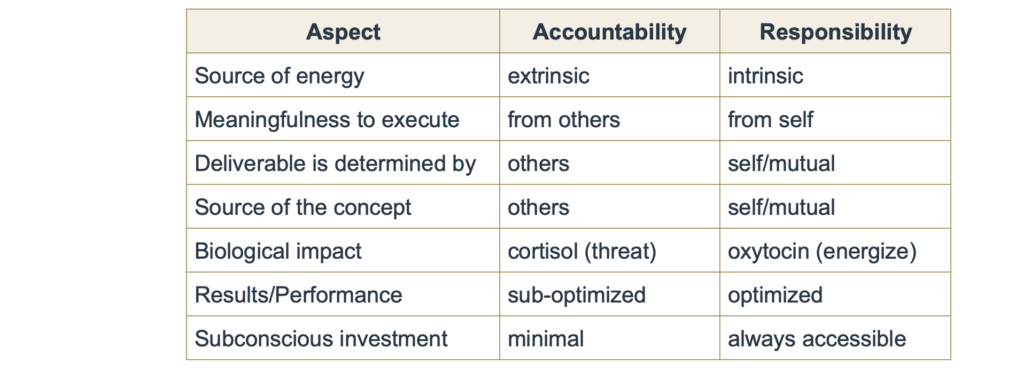The Role of Energy and the Power of Responsibility

There may never have been a time, in recent history, like the present when people have had a chance to stop and reflect on how they are living their lives.
While the current situation requires us to slow down, it also provides us with the time and opportunity for personal reflection. What am I doing with this life? What is energizing, and what is de-energizing about my life? Am I living a meaningful and energizing life, or am I living my life at someone else’s direction? Do I have a choice?
Tapping into our Intrinsic Energy
Early in life, we do not have the experience or knowledge for meaningful decision-making. We listen to others and do what parents, teachers, and respected advisors say we should do. We are rewarded for doing what others say we should do. As we mature and gain the knowledge and experience needed to make our own decisions, we begin to realize that we like the independence of owning our decisions and being responsible. We feel valued.
This hit me at the age of 28 while working in New York City as a management consultant. The work I did for our clients was energizing. However, the commute from Connecticut, the constant travel, the lack of respect from my superiors, and the lack of trust in my peers made me ask, “Is this the way I have to live?”
Then, a time of reflection was forced upon me. I spent four nights and five days in the hospital with our two-year-old son, who was unconscious due to complications from the flu. During that time, I realized my work life was no longer energizing and it was impacting my personal life. I was doing what others wanted done without them valuing my thoughts or ideas. Our son fully recovered and I made the decision to change jobs. Six months later, I was working for Head Coach Bo Schembechler at the University of Michigan Football Program. The intrinsically-energized growth trajectory of my life started with that job change. The benefits of that reflection continue today.
The change in my intrinsic energy was stunning. I went to work energized to work with people I trusted, knowing daily that I was valued and respected for what I could bring to the team. We shared a growth mindset, believing none of us were as good as we could be, but knowing that together we could become something special. It was about supporting each other and the Michigan community we wanted to honor. Our shared responsibility was the development of young men who could positively impact their communities.
This culture of respect, trust, growth, and responsibility for a deeply meaningful purpose was just the culture I needed to flourish. Now, once again, with this time to reflect, I remember what it was like to not have the intrinsic energy required to be great.
What is the Source of Intrinsic Energy?
Intrinsic energy may be the most valuable resource to help leaders and organizations unleash their greatness. Being sensitive to the source of team members’ intrinsic energy is vital to achieving greatness. There are few assets more valuable and less expensive to develop.
Investing in the development of team members’ intrinsic energy enables them to want to help the organization become even better. Not because they have to, but because they want to. Likewise, the impact of the energy drain of team members who feel they have to is contagious. Leaders can improve employee and team engagement by understanding the source of the energy that is generated in a culture that focuses on responsibility rather than accountability.
Accountability vs. Responsibility
Understanding the difference between accountability and responsibility is critical for leaders who seek greatness. Great leaders not only understand the distinction, but they are also dialed into the impact that differentiating between them can have for their team members and thus the organization.
Great leaders are supported by team members that are intrinsically motivated to want to do the right thing at the right time for the organization, as opposed to team members who do a job because they have to. These leaders seek team members who want to take responsibility and respect the desire for each team member to live a life of meaning by making a contribution. By doing so, leaders are creating energy for sustainable success.
Leaders who do not understand the value of the intrinsic energy that comes from an individual making a contribution may rely on accountability—”Do what I tell you to do.” Those who lead this way are continually challenged to motivate their team for sustainable success. “Those leaders cannot go home and eat dinner,” as David Marquet shares in Turn the Ship Around, “they must always be present to get the effort needed for success. It is up to the leader to provide the extrinsic energy that drives what they hope will become a success.”
Interchangeable or Misunderstood and Misused?
There are a variety of interpretations in literature and in the dictionary regarding the definitions of responsibility and accountability. When we ask clients the difference between them, most often, the response is “responsibility comes from the inside of us, accountability is an external force.”
Our Fulfillment
When we feel responsible, there is intrinsic energy that comes into our life that is fulfilling. We accomplish because we want to, not because we have to. The effort is intrinsically deeply meaningful to us. For us to take responsibility, we must feel ownership. For us to feel ownership, it must feel like we are making a contribution to something meaningful. When we are connected to a meaningful purpose, we can take responsibility and commit to fulfilling our job responsibility.
Definitions
Accountability – Doing something that others have determined must be done the way they want it done. What, when, how, and by whom are determined by someone else. Accountability tends to be top-down.
Responsibility – Taking ownership of the deliverable that has been clearly outlined. Building upon suggested or past processes to deliver the desired results. Owning the process for the outcome. Intrinsic energy enables the best possible results with the least amount of resources.
Comparisons

Questions for Leaders to Consider
- Does my team feel a responsibility for their work, such that they may be subconsciously thinking about how they can do their work better?
- Am I respecting my team members’ desire to make a contribution to our success?
- What can I do to help increase the ownership of decision making throughout my organization?






